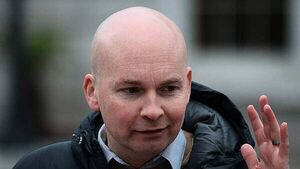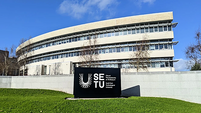Court grants permission for Paul Murphy to serve super junior minster injunction proceedings

High Court reporters
The High Court has granted People Before Profit-Solidarity TD Paul Murphy permission to serve on the Taoiseach and Attorney General his proceedings claiming that the attendance of super junior ministers at Cabinet meetings is unconstitutional.
Among the reliefs sought by Deputy Murphy in the High Court is an injunction restraining the attendance of “Ministers of State attending Cabinet” – or super junior ministers – at meetings of the Government.
Mr Murphy’s case claims that the attendance and/or participation of super junior ministers at government meetings is inconsistent with Bunreacht na hÉireann for several reasons.
In a sworn statement filed to the court, Mr Murphy’s solicitor Patrick Kevans claims the proceedings “raise issues of transcendent constitutional importance”.
“It is imperative for the appropriate conduct of Government and compliance with the Constitution that the within proceedings be determined as a matter of urgency,” he says.
Mr Justice Brian Cregan on Tuesday granted liberty to John Rogers SC, appearing with Paul Gunning BL for Mr Murphy, to serve the proceedings at short notice on the defendants in the case – the Taoiseach, the Government, Ireland and the Attorney General. As the application was made ex parte, the defendants were not represented in court.
Mr Murphy’s action comes after Sinn Féin TD Patrick “Pa” Daly was granted leave by the High Court last month to pursue judicial review proceedings alleging the appointment of super junior ministers is “completely anti-democratic”.
Mr Kevans says there are “significant distinctions” between Mr Murphy’s and Mr Daly’s action.
Fine Gael’s Hildegarde Naughton, Regional Independent Group members Seán Canney and Noel Grealish, and Fianna Fáil’s Mary Butler are super junior ministers, and presently participate at Government meetings (although they do not vote). Ms Butler is the Government’s chief whip.
Senior government ministers are appointed by the President of Ireland on the advice of the Taoiseach and with the prior approval of Dáil Éireann. Super junior ministers are appointed by the Government on the nomination of the Taoiseach.
Mr Murphy’s case claims that the attendance of super junior ministers at Cabinet is inconsistent with various provisions of Article 28 of Bunreacht na hÉireann, which stipulates – among other things – that the government shall consist of not more than 15 members.
The proceedings also raise questions regarding Cabinet confidentiality.
Mr Murphy’s case cites a Sunday Times article written by former Taoiseach Leo Varadkar, which states: “Politicians are hamstrung by our Constitution which limits the number of senior ministers to 15 ... I tried to get around the “rule of 15″ by creating three super-junior ministries with real and clearly defined responsibilities.”
It also refers to comments made by Regional Independent Group member Michael Lowry, reported in The Irish Times: “The two super junior ministers Sean Canney and Noel Grealish, those two gentlemen will sit at the cabinet table, will have access to all cabinet papers, contribute at cabinet, and Sean will attend all of the leaders’ meetings on our behalf.”
Mr Kevans says that Mr Varadkar’s column and Mr Lowry’s comments suggest that super junior ministers “fully participate in Government meetings in a very effective sense”.
He describes the use of super juniors as a “device” to “get around” the Constitution as “entirely inappropriate, unlawful, and unconstitutional”.
Mr Kevan’s statement also notes how it was outlined to the defendants what they say are “a number of very significant distinctions” between Mr Murphy’s case and Mr Daly’s case, pushing back against the Chief State Solicitor’s Office’s suggestion that the People Before Profit-Solidarity TD await the conclusion of the latter’s proceedings before pursuing his action.
He notes that he seeks injunctive reliefs restraining the attendance of super junior ministers at government meetings, whereas Mr Daly is seeking declaratory reliefs.
Mr Justice Cregan adjourned the case to next week.





